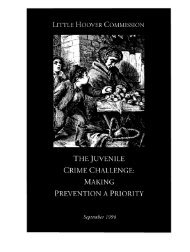Jailhouse Lawyer's Handbook - Sentencing and Justice Reform ...
Jailhouse Lawyer's Handbook - Sentencing and Justice Reform ...
Jailhouse Lawyer's Handbook - Sentencing and Justice Reform ...
Create successful ePaper yourself
Turn your PDF publications into a flip-book with our unique Google optimized e-Paper software.
WRITE STATEMENT HERE<br />
I declare under penalty of perjury that the foregoing<br />
is true <strong>and</strong> correct. Executed at (city <strong>and</strong> state) on<br />
(date).<br />
________________________<br />
Signature.<br />
The declaration is in the name, <strong>and</strong> signed by, the<br />
person who knows the relevant facts. This could be<br />
anyone: it does not have to be from you or another<br />
plaintiff. It is helpful to submit declarations from other<br />
people who were witnesses to events that you describe<br />
in your complaint or who know facts that you need to<br />
prove. These declarations may be important when<br />
prison officials move for summary judgment against<br />
you. Summary judgment is explained in Chapter Four,<br />
Section D.<br />
You can submit declarations from plaintiffs or other<br />
people along with your complaint. Each declaration is<br />
an “exhibit” in support of the complaint <strong>and</strong> each<br />
exhibit has its own letter – “Exhibit A,” “Exhibit B,”<br />
etc. You can also submit letters from prison officials,<br />
copies of rules, <strong>and</strong> any other relevant document as<br />
lettered exhibits. You can refer to these exhibits when<br />
you state the facts of your case in your complaint. You<br />
do not have to submit declarations or other evidence<br />
when you file a complaint. But considering how<br />
frequently judges dismiss or discredit prisoner<br />
complaints, if you have strong support for your facts, it<br />
may be in your best interests to show the court right<br />
away.<br />
You can also submit declarations later in your suit.<br />
You can submit declarations any time you get them. In<br />
some situations, which will be explained later in this<br />
<strong>H<strong>and</strong>book</strong>, you are required to submit declarations<br />
from yourself <strong>and</strong> other plaintiffs.<br />
D. HOW TO FILE YOUR LEGAL PAPERS<br />
As explained above, it is very important to request the<br />
Local Rules from the district you plan to file in,<br />
because different courts require different numbers of<br />
copies, <strong>and</strong> may have different rules about filing. You<br />
should follow the local rules whenever possible. In<br />
general, though, you will need to send the original of<br />
each document <strong>and</strong> one copy for each defendant to the<br />
Clerk of the Court for the United States District Court<br />
for your district. Include two extra copies – one for the<br />
judge <strong>and</strong> one for the clerk to endorse (showing when<br />
<strong>and</strong> where it was filed) <strong>and</strong> return to you as your<br />
IMPORTANCE OF DECLARATIONS:<br />
It is always helpful to submit declarations. You<br />
can submit them anytime you get them. If there<br />
are people who were witnesses to events that you<br />
describe in your complaint, or who know facts<br />
that you need to prove, ask them to fill out <strong>and</strong><br />
sign a declaration. It will help strengthen your<br />
suit in general, <strong>and</strong> can stop prison officials from<br />
getting a “summary judgment” against you.<br />
official copy. The court will have a marshal deliver a<br />
copy to each defendant, unless you ask that someone<br />
else be appointed to deliver them.<br />
Be sure to keep your own copy of everything you send<br />
the court, in case your papers are lost in the mail or<br />
misplaced in the clerk’s office. If you cannot make<br />
photocopies, make copies by h<strong>and</strong>.<br />
E. GETTING IMMEDIATE HELP FROM THE<br />
COURT.<br />
Ordinarily a federal lawsuit goes on for months or even<br />
years before the court reaches any decision. But you<br />
may need help from the court long before that. A U.S.<br />
District Judge has the power to order prison officials to<br />
stop doing certain things while the judge is considering<br />
your suit. The judge can do this by issuing a<br />
Temporary Restraining Order (TRO) <strong>and</strong> / or a<br />
Preliminary Injunction.<br />
1. When You Can Get Immediate Help<br />
Chapter Two, Section D explains when you are eligible<br />
for an injunction. By way of review, to get any kind of<br />
injunction, you must show<br />
1) an ongoing, illegal practice by the defendant,<br />
<strong>and</strong><br />
2) that money damages will not fix your injury.<br />
A “preliminary injunction” is an order from the judge<br />
that addresses your concerns during the period after<br />
you file your complaint, but before you have a trial.<br />
Federal Rules of Civil Procedure Rule 65(a) sets out the<br />
requirements for a preliminary injunction.<br />
On top of fulfilling the two requirements above, you<br />
must also show that:<br />
3) Without the court’s help you are likely to suffer<br />
irreparable harm;<br />
4) You are likely to succeed at trial;<br />
JAILHOUSE LAWYERS HANDBOOK – CHAPTER THREE<br />
48





